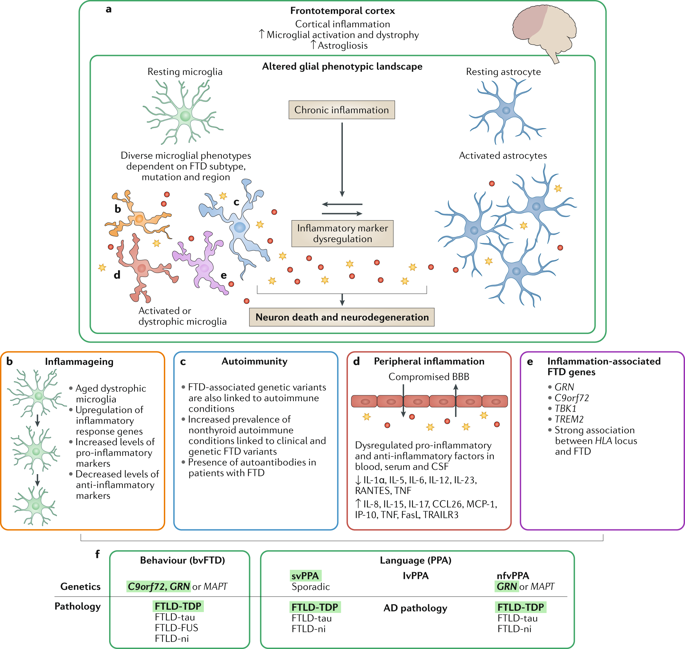当前位置:
X-MOL 学术
›
Nat. Rev. Neurol.
›
论文详情
Our official English website, www.x-mol.net, welcomes your
feedback! (Note: you will need to create a separate account there.)
Neuroinflammation in frontotemporal dementia.
Nature Reviews Neurology ( IF 28.2 ) Pub Date : 2019-07-19 , DOI: 10.1038/s41582-019-0231-z Fiona Bright 1 , Eryn L Werry 2 , Carol Dobson-Stone 3, 4, 5 , Olivier Piguet 3, 6, 7 , Lars M Ittner 8 , Glenda M Halliday 3, 4 , John R Hodges 3, 4, 7 , Matthew C Kiernan 3, 4, 9 , Clement T Loy 10 , Michael Kassiou 2 , Jillian J Kril 1
Nature Reviews Neurology ( IF 28.2 ) Pub Date : 2019-07-19 , DOI: 10.1038/s41582-019-0231-z Fiona Bright 1 , Eryn L Werry 2 , Carol Dobson-Stone 3, 4, 5 , Olivier Piguet 3, 6, 7 , Lars M Ittner 8 , Glenda M Halliday 3, 4 , John R Hodges 3, 4, 7 , Matthew C Kiernan 3, 4, 9 , Clement T Loy 10 , Michael Kassiou 2 , Jillian J Kril 1
Affiliation

|
Frontotemporal dementia (FTD) refers to a group of progressive neurodegenerative disorders with different pathological signatures, genetic variability and complex disease mechanisms, for which no effective treatments exist. Despite advances in understanding the underlying pathology of FTD, sensitive and specific fluid biomarkers for this disease are lacking. As in other types of dementia, mounting evidence suggests that neuroinflammation is involved in the progression of FTD, including cortical inflammation, microglial activation, astrogliosis and differential expression of inflammation-related proteins in the periphery. Furthermore, an overlap between FTD and autoimmune disease has been identified. The most substantial evidence, however, comes from genetic studies, and several FTD-related genes are also implicated in neuroinflammation. This Review discusses specific evidence of neuroinflammatory mechanisms in FTD and describes how advances in our understanding of these mechanisms, in FTD as well as in other neurodegenerative diseases, might facilitate the development and implementation of diagnostic tools and disease-modifying treatments for FTD.
中文翻译:

额颞痴呆的神经炎症。
额颞叶痴呆(FTD)是指一组进展性神经退行性疾病,具有不同的病理特征,遗传变异和复杂的疾病机制,尚无有效的治疗方法。尽管在理解FTD的基本病理学方面取得了进步,但仍缺乏该疾病的敏感和特异性液体生物标志物。与其他类型的痴呆一样,越来越多的证据表明神经炎症与FTD的发展有关,包括皮质炎症,小胶质细胞活化,星形胶质细胞增多和周围炎症相关蛋白的差异表达。此外,已经确定了FTD和自身免疫性疾病之间的重叠。然而,最重要的证据来自基因研究,并且一些与FTD相关的基因也与神经炎症有关。
更新日期:2019-11-18
中文翻译:

额颞痴呆的神经炎症。
额颞叶痴呆(FTD)是指一组进展性神经退行性疾病,具有不同的病理特征,遗传变异和复杂的疾病机制,尚无有效的治疗方法。尽管在理解FTD的基本病理学方面取得了进步,但仍缺乏该疾病的敏感和特异性液体生物标志物。与其他类型的痴呆一样,越来越多的证据表明神经炎症与FTD的发展有关,包括皮质炎症,小胶质细胞活化,星形胶质细胞增多和周围炎症相关蛋白的差异表达。此外,已经确定了FTD和自身免疫性疾病之间的重叠。然而,最重要的证据来自基因研究,并且一些与FTD相关的基因也与神经炎症有关。










































 京公网安备 11010802027423号
京公网安备 11010802027423号